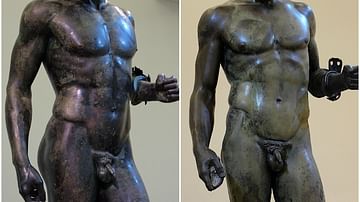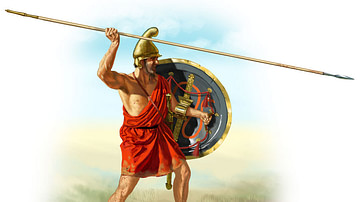Search
Did you mean: Silla?
Search Results

Definition
Athena
Athena was the goddess of wisdom, war, and the crafts. She was the favourite daughter of Zeus and was, perhaps, the wisest, most courageous, and certainly the most resourceful of the Olympian gods. Zeus was told that his son would take his...

Definition
Roman Army
The Roman army, famed for its discipline, organisation, and innovation in both weapons and tactics, allowed Rome to build and defend a huge empire which for centuries would dominate the Mediterranean world and beyond. Overview The Roman...

Definition
Amazon Women
In Greek mythology, the Amazons were a race of warlike women noted for their riding skills, courage, and pride, who lived at the outer limits of the known world, sometimes specifically mentioned as the city of Themiskyra on the Black Sea...

Definition
Ivar the Boneless
Ivar the Boneless (Old Norse Ívarr hinn Beinlausi) is known from Old Norse and medieval Latin sources as the son of the legendary Viking king Ragnar Lothbrok, in these stories raiding alongside his father and brothers and becoming the ruler...

Definition
Vulcan
Vulcan or Volcanus was the Roman god of fire and forge, the equivalent of Hephaestus from Greek mythology. The son of Jupiter and Juno, he was the special patron of blacksmiths and artisans. As the god of the forge and the devastating fire...

Definition
Riace Bronzes
The Riace Bronzes, also known as the Riace Warriors, are a pair of bronze statues most likely sculpted in Greece in the mid-5th century BCE and rescued from the Ionian Sea near Riace Marina, Italy in 1972 CE. Slightly larger than life-size...

Definition
Edward the Black Prince
Edward of Woodstock (1330-1376 CE), better known as the Black Prince after his distinctive armour or martial reputation, was the eldest son of Edward III of England (r. 1327-1377 CE). Made the Prince of Wales in 1343 CE, Edward would fight...

Definition
Hellenistic Warfare
When Alexander the Great died in 323 BCE, he left behind an empire devoid of leadership. Without a named successor or heir, the old commanders simply divided the kingdom among themselves. For the next three decades, they fought a lengthy...

Definition
Hypaspist
The hypaspists or hypaspistai were a distinct type of infantry soldier who served as a vital part of the Macedonian armies of both Phillip II of Macedon (r. 359 BCE - 336 BCE) and his son and heir Alexander the Great (r. 336-323 BCE). The...

Article
Spartan Women
Spartan women had more rights and enjoyed greater autonomy than women in any other Greek city-state of the Classical Period (5th-4th centuries BCE). Women could inherit property, own land, make business transactions, and were better educated...